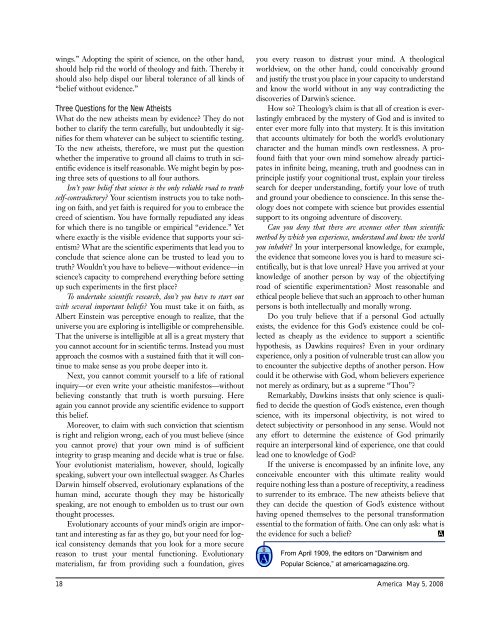Download PDF - America
Download PDF - America
Download PDF - America
You also want an ePaper? Increase the reach of your titles
YUMPU automatically turns print PDFs into web optimized ePapers that Google loves.
wings.” Adopting the spirit of science, on the other hand,should help rid the world of theology and faith. Thereby itshould also help dispel our liberal tolerance of all kinds of“belief without evidence.”Three Questions for the New AtheistsWhat do the new atheists mean by evidence? They do notbother to clarify the term carefully, but undoubtedly it signifiesfor them whatever can be subject to scientific testing.To the new atheists, therefore, we must put the questionwhether the imperative to ground all claims to truth in scientificevidence is itself reasonable. We might begin by posingthree sets of questions to all four authors.Isn’t your belief that science is the only reliable road to truthself-contradictory? Your scientism instructs you to take nothingon faith, and yet faith is required for you to embrace thecreed of scientism. You have formally repudiated any ideasfor which there is no tangible or empirical “evidence.” Yetwhere exactly is the visible evidence that supports your scientism?What are the scientific experiments that lead you toconclude that science alone can be trusted to lead you totruth? Wouldn’t you have to believe—without evidence—inscience’s capacity to comprehend everything before settingup such experiments in the first place?To undertake scientific research, don’t you have to start outwith several important beliefs? You must take it on faith, asAlbert Einstein was perceptive enough to realize, that theuniverse you are exploring is intelligible or comprehensible.That the universe is intelligible at all is a great mystery thatyou cannot account for in scientific terms. Instead you mustapproach the cosmos with a sustained faith that it will continueto make sense as you probe deeper into it.Next, you cannot commit yourself to a life of rationalinquiry—or even write your atheistic manifestos—withoutbelieving constantly that truth is worth pursuing. Hereagain you cannot provide any scientific evidence to supportthis belief.Moreover, to claim with such conviction that scientismis right and religion wrong, each of you must believe (sinceyou cannot prove) that your own mind is of sufficientintegrity to grasp meaning and decide what is true or false.Your evolutionist materialism, however, should, logicallyspeaking, subvert your own intellectual swagger. As CharlesDarwin himself observed, evolutionary explanations of thehuman mind, accurate though they may be historicallyspeaking, are not enough to embolden us to trust our ownthought processes.Evolutionary accounts of your mind’s origin are importantand interesting as far as they go, but your need for logicalconsistency demands that you look for a more securereason to trust your mental functioning. Evolutionarymaterialism, far from providing such a foundation, givesyou every reason to distrust your mind. A theologicalworldview, on the other hand, could conceivably groundand justify the trust you place in your capacity to understandand know the world without in any way contradicting thediscoveries of Darwin’s science.How so? Theology’s claim is that all of creation is everlastinglyembraced by the mystery of God and is invited toenter ever more fully into that mystery. It is this invitationthat accounts ultimately for both the world’s evolutionarycharacter and the human mind’s own restlessness. A profoundfaith that your own mind somehow already participatesin infinite being, meaning, truth and goodness can inprinciple justify your cognitional trust, explain your tirelesssearch for deeper understanding, fortify your love of truthand ground your obedience to conscience. In this sense theologydoes not compete with science but provides essentialsupport to its ongoing adventure of discovery.Can you deny that there are avenues other than scientificmethod by which you experience, understand and know the worldyou inhabit? In your interpersonal knowledge, for example,the evidence that someone loves you is hard to measure scientifically,but is that love unreal? Have you arrived at yourknowledge of another person by way of the objectifyingroad of scientific experimentation? Most reasonable andethical people believe that such an approach to other humanpersons is both intellectually and morally wrong.Do you truly believe that if a personal God actuallyexists, the evidence for this God’s existence could be collectedas cheaply as the evidence to support a scientifichypothesis, as Dawkins requires? Even in your ordinaryexperience, only a position of vulnerable trust can allow youto encounter the subjective depths of another person. Howcould it be otherwise with God, whom believers experiencenot merely as ordinary, but as a supreme “Thou”?Remarkably, Dawkins insists that only science is qualifiedto decide the question of God’s existence, even thoughscience, with its impersonal objectivity, is not wired todetect subjectivity or personhood in any sense. Would notany effort to determine the existence of God primarilyrequire an interpersonal kind of experience, one that couldlead one to knowledge of God?If the universe is encompassed by an infinite love, anyconceivable encounter with this ultimate reality wouldrequire nothing less than a posture of receptivity, a readinessto surrender to its embrace. The new atheists believe thatthey can decide the question of God’s existence withouthaving opened themselves to the personal transformationessential to the formation of faith. One can only ask: what isthe evidence for such a belief?AFrom April 1909, the editors on “Darwinism andPopular Science,” at americamagazine.org.18 <strong>America</strong> May 5, 2008









